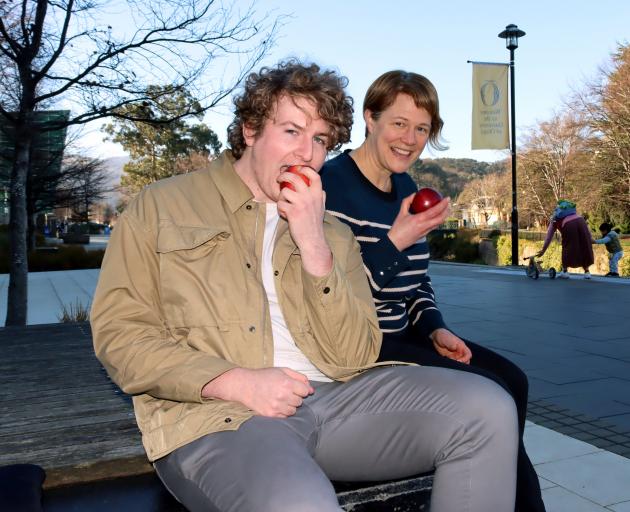Science
Student Analyzes 300 Apple Varieties to Preserve Heritage Cultivars

Aaron Hewson, a master of science student specializing in plant biotechnology, is conducting significant research on over 300 apple varieties from the Jim Dunckley Heritage Orchard in New Zealand. Established 25 years ago by the Coastal Otago Branch of the New Zealand Tree Crops Association, this orchard is widely regarded as one of the most diverse collections of apple cultivars in the country.
Hewson’s work focuses on preserving and propagating these heritage cultivars, ensuring they can be confidently identified through genetic means. The orchard’s collection originated in the 1990s, primarily sourced by Jim Dunckley from various locations across Otago and Southland, with the majority of cultivars coming from an old Plant & Food orchard in Clyde.
Unraveling Genetic Mysteries
The collection features apple varieties with unique names such as Peasgood Nonsuch, Nonnetit Bastard, Warner’s King, and Albany Beauty. Some trees bear names given by local farmers that reference nearby landmarks, but these names do not always align with the genetic identity of the apples. For instance, Hewson noted a situation where a variety named Granny Smith appeared genetically identical to another named Lord Lambourne, suggesting that one of the names may be incorrect.
To investigate these genetic identities, samples were collected by university students and staff from the Plant Biochemistry Lab, labeled, and freeze-dried. These samples were then sent to a laboratory in France for analysis, facilitated by Plant & Food Research, which is now part of the Bioeconomy Science Institute. Hewson acknowledged the essential support provided by his co-supervisor, Dr. Elena Lopez-Girona, during this process.
“They allowed us to send our samples with their bulk group of samples for genotyping by SNP chip,” he explained. This technique examines about 50,000 known DNA hotspots in an apple leaf, creating a genetic fingerprint that clarifies whether two trees are the same variety or different.
Importance of Genetic Diversity
With stringent biosecurity rules making it challenging to import new apple genetics, the local collection from the Jim Dunckley Heritage Orchard could become crucial for developing disease resistance and other beneficial traits. “Worldwide, there are approximately 10,000 different apple varieties,” Hewson remarked. “Yet all of our commercial varieties stem from just six apples, resulting in an incredibly narrow genetic base.”
Associate Professor Lynnette Brownfield from the University of Otago, who serves as Hewson’s other co-supervisor, emphasized the importance of identifying the varieties within the orchard. This knowledge could assist breeders in discovering new genetic material, including traits for disease resistance, thus broadening future breeding options.
The Coastal Otago Branch of the New Zealand Tree Crops Association owns the orchard and will ultimately determine how to utilize the findings from this research. The objective is to assign unique identifiers to each tree, fully cataloging the collection. This will facilitate communication with apple breeders, ranging from backyard growers to larger organizations like Plant & Food Research, and ensure that germplasm is available as needed.
Hewson’s research not only aims to preserve the heritage of New Zealand’s unique apple varieties but also to contribute to the broader agricultural landscape by enhancing genetic diversity in apple breeding.
-

 World4 months ago
World4 months agoTest Your Knowledge: Take the Herald’s Afternoon Quiz Today
-

 Sports4 months ago
Sports4 months agoPM Faces Backlash from Fans During Netball Trophy Ceremony
-

 Lifestyle4 months ago
Lifestyle4 months agoDunedin Designers Win Top Award at Hokonui Fashion Event
-

 Entertainment4 months ago
Entertainment4 months agoExperience the Excitement of ‘Chief of War’ in Oʻahu
-

 Sports4 months ago
Sports4 months agoLiam Lawson Launches New Era for Racing Bulls with Strong Start
-

 World5 months ago
World5 months agoCoalition Forms to Preserve Māori Wards in Hawke’s Bay
-

 Health4 months ago
Health4 months agoWalking Faster Offers Major Health Benefits for Older Adults
-

 Lifestyle4 months ago
Lifestyle4 months agoDisney Fan Reveals Dress Code Tips for Park Visitors
-

 Politics4 months ago
Politics4 months agoScots Rally with Humor and Music to Protest Trump’s Visit
-

 Top Stories5 months ago
Top Stories5 months agoUK and India Finalize Trade Deal to Boost Economic Ties
-

 Health2 months ago
Health2 months agoRadio Host Jay-Jay Feeney’s Partner Secures Visa to Stay in NZ
-

 World5 months ago
World5 months agoHuntly Begins Water Pipe Flushing to Resolve Brown Water Issue









